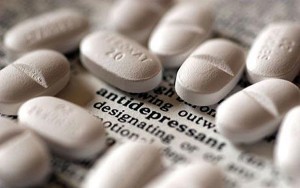
Black box warnings with an increased risk of suicidal behavior have existed on antidepressants since 2004, yet more than 2 million children are on these drugs.
Federal health regulators announced in April 2019 that manufacturers of certain sleeping pills must now include a “black box” warning alerting consumers of the potential for serious or life-threatening side effects.
This is what the agency’s safety alert says: “Patients, stop taking your insomnia medicine and contact your health care professional right away if you experience a complex sleep behavior where you engage in activities while you are not fully awake, or if you do not remember activities you have done while taking the medicine.” [1]
The warning is a start, but the Citizens Commission on Human Rights (CCHR) states that this is not enough given the fact that black box warnings on antidepressants have existed since 2004 yet more than 2 million children are on these drugs.
According to CCHR, the Food and Drug Administration’s (FDA) continuing clearance of potentially addictive and dangerous psychotropic drugs and, more recently, electroshock treatment devices, fuels a lucrative $35 billion a year industry at the cost of consumers’ mental health and lives.
CCHR points out that more than 43.6 million Americans each year are now taking antidepressants – once called “miracle pills;” but psychiatrists now claim that the drugs don’t work in one out of every three people taking them. “Side effects” of antidepressants include suicidal thoughts and violence-related effects— “hardly a recipe for improving depression,” says CCHR. [2]
“The marketing of dangerous drugs is big business in this country and the FDA’s black box warnings fail to adequately protect consumers,” said Diane Stein, president of the Florida chapter of CCHR. “Quite likely pharmaceutical companies and psychiatrists view these warnings merely as the cost of doing business.”
Dr. Ilene Rosen, a professor of clinical medicine at the University of Pennsylvania’s school of medicine reports that she has been telling her patients about these risks for the last 15 years. She also states that the sleep community is well aware of the dangers mentioning that these types of drugs were not part of the “formulary” of recommended drugs at the hospital for inpatients at the University of Pennsylvania because of their connection to sleepwalking, falls and other problems.
In 2012 a study linked hypnotic sleep aids such as zolpidem, eszopiclone, zaleplon and others to a higher risk of early death. This includes patients who only took 18 pills a year! And those who were prescribed the most hypnotics were 35% more likely to develop a new cancer after only 2.5 years of follow up.
That study only showed “associations” rather than direct cause and effect. But in 2018 a review concluded that “hypnotics are related to serious illnesses and premature deaths from cancer, serious infections, mood disorders, accidental injuries, suicides and homicides.” [3]
Since insomnia drugs and other dangerous pharmaceuticals such as anti-depressants are still on the market, FDA warnings appear as a mere hand slap. The bottom line is that pharmaceutical companies are making a lot of money from these drugs and there appears to be little, if any concern for the health and safety of the consumers.
Sources:
[1] https://www.nytimes.com/2019/04/30/health/sleep-drugs-ambien-side-effects.html?smid=nytcore-ios-share
[2] https://www.cchrint.org/psychiatric-drugs/antidepressantsideeffects/
[3] http://time.com/5584937/sleeping-pills-safe/

Hello, this is really necessary. Because last year I had problems with the nervous system because of sleeping pills … Insomnia most often occurs in older people who go to bed early and, moreover, often sleep during the day. Thus, experts conclude that you need to give up daytime sleep instead of treating the nighttime insomnia caused by it. Another danger is excessive dosages, I, in turn, constantly increased the dose, perhaps this was the cause of all the problems. I wish you all good health, be vigilant.